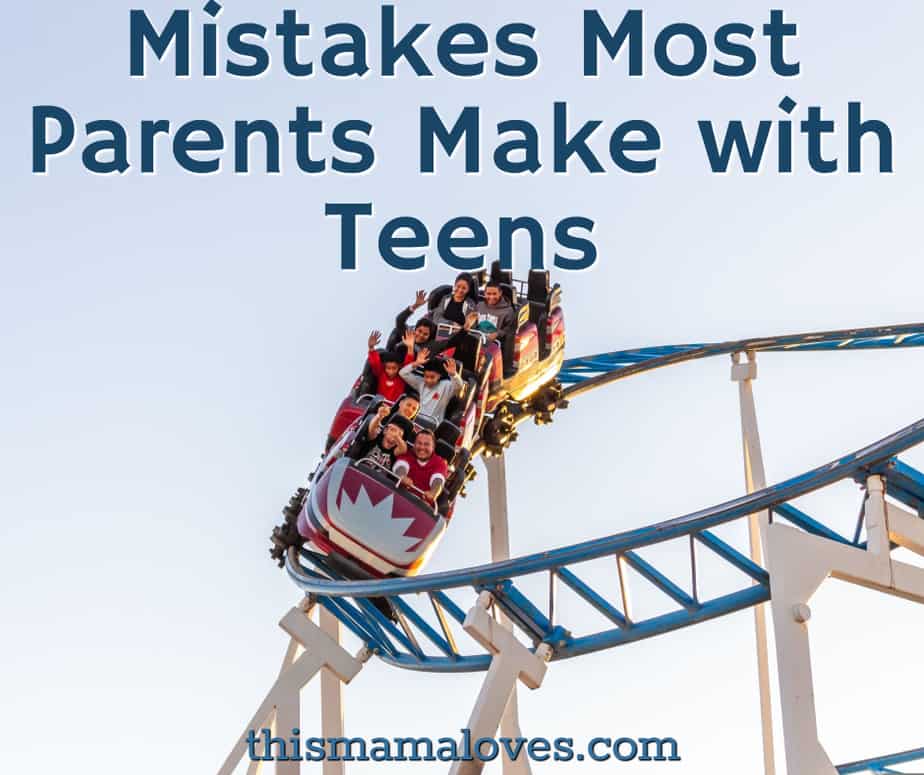Many people associate teen discipline with rage, misconceptions, loud voices, constraints, and curfews. But wouldn’t you instead think about respect, moving into maturity, logical conversations, and reasonable behavior? The formula for parenting children requires a precise mix of power and affection.

Mistakes Most Parents Make with Teens
With teenagers, that relationship only becomes more delicate. How do you punish your adolescent without ruining your relationship? These mistakes most parents make with teens are brought to you by a visiting author.
Understand Your Child’s Emotions- or Acknowledge Them
Do not dismiss or minimize your child’s emotions. Saying things like, “It’s not a big issue,” or “It’s not significant” adds to adolescents’ sense of being misunderstood. If your adolescent is angry about anything, it must be significant to them. Recognize the significance of the problem and their emotions.
Then explain it to them. Failure to do so will create a rift between you and your kid. When they strive towards a goal but fail to achieve it, discussing it will help them feel understood and acknowledged.

Reading Too Many Parenting Books
Reading parenting books is not the wrong way to get to understand your teen better. The books and experts have no clue how your connection has evolved, and they have no understanding of how your kid responds to certain situations. Trusting parenting books above your intuition, on the other hand, is something you should not accept in your life.
Following experts instead of believing yourself can frequently take you to a dead-end and tie you up in knots, which is not a position you want to be in with your child. Try to utilize the books when your kid exhibits an unusual circumstance or behavior, rather than in daily settings, and you will get much good feedback.
Expecting the Worst
Every parent worries that their children may use drugs, engage in unprotected sex, or hang out with the wrong crowd, all of which will negatively impact their children. Instead, pay close attention to your child’s interests and activities. Focus on what your kid enjoys doing and establish a consistent connection with them from a young age. The dread of the aforementioned negative behaviors will remain natural, but try not to remind them of them too often.
If you direct their attention to the positive aspects of life, your child will have no time and will not have even a single thought about the negative aspects.
Overreacting over Minor Issues
Were you bothered by your adolescent daughter’s haircut? Did she begin listening to weird music and dressing strangely? Please don’t do anything; it’s simply a period in her life.
You’ll push her away if you attempt to intervene here. Please focus on the broad picture, on the actual objective you want her to accomplish, such as education, rather than a single haircut that will be attractive to her in the next two weeks. She’ll realize she’s made a mistake and laughs at her photos in ten years.

Ignoring the Important Stuff
This is one of the worst mistakes most parents make. If you suspect that your child is using drugs or drinking irresponsibly, you should take action. This is your chance to intervene and put a stop to it from the ground up. Academic achievement and conduct will provide you with the most crucial indicator of whether your hunch is correct or incorrect.
If that is the case, it’s wise for you take action. If there are empty bottles or pill packets in the kid’s garbage, you should not turn your attention away; this is how a drug addict begins.
Permissive Parenting
Teenagers and discovering stuff out for themselves do not always end well. One of the most common errors is liberal parenting, which includes no boundaries, few instructions, and many other similar things. This is mostly the case if your kid is a teenager. The causes may range from the parent themselves not having boundaries as a child to becoming fed up with limitations for various reasons.
Whatever it might be, that would be the worst way of raising an adolescent.
Set achievable goals
Never set unreasonable expectations for your kid or keep comparing them to others. When your kid attempts to work with a certain level of expectation, they tend to feel like a failure if they fail to meet them. Make sure that your adolescent establishes reasonable academic objectives that are not out of reach.
Accepting Responsibility
Please do not come to your child’s aid or accept responsibility when they suffer from homework or have a complicated issue. If you do for your kid something they can do for themselves, it conveys the message that s/he is incapable. Allow your kid not to blame others for their shortcomings.
If your adolescent learns to accept responsibility for their mistakes, they will be more likely to get credit for their achievements. Furthermore, encouraging your kid to take responsibility for their errors is the best way to give them a learning experience with every experience.
Praise Your Child
Finally, do not over-praise your kid. Giving praise without merit dilutes its sincerity. Praise your kid only when it is due. Only provide helpful advice when it is necessary. According to experts, the ideal ratio is four compliments for every complaint.
So, help your kid by setting realistic objectives with plenty of room for achievement.
Trying to be Your Teen’s Best Friend
Your teenager already has enough friends and doesn’t want another one. They need you as a parent, role model, and mentor. This is not to say that you can’t get out with a buddy, speak about sensitive topics like sex and STDs. It does not have to be awkward, talk to them on prevention measures and cases where they need to go for chlamydia treatment. It will help if you avoid judging them.
But keep in mind that what he wants is someone to look up to and help him draw the lines. A buddy is not qualified to play that position.
Not getting to know Classmates and their Families
Peers have a considerable effect on teenagers. Spend time learning about her friends and keeping an open home for them. If possible, try to discover a bit about her friends’ families, but be careful not to invade privacy.
Belittling their ideas
Teens often have great ideals that are simply impractical. However, dismissing the concept may cause your youngster to lose confidence. Respond with enthusiasm instead.
You don’t have to proclaim you think it’s a good idea, but you might ask them why they like it or how they intend to implement it. Simply listening to them and asking probing questions may not only offer your adolescent support but also help them determine if it’s a realistic concept or not on their own.
Quick Disapproval
Expressing disapproval, judgment, or terror is the quickest method to persuade an adolescent to shut talking. Remember that teenagers often say things for shock, but this does not always imply that they will follow through. Stay calm no matter what your adolescent says.
Before you say anything, be sure you have fully heard and understood your teen’s side of the tale. Ask questions to demonstrate that you are paying attention and to ensure that you know the whole narrative. When you’re ready to express your thoughts, avoid phrases that begin with “you.” Your adolescent will get defensive if you say things such, “you should have…”, “you need to…”, or “you make me feel…” Use “I” sentences to convey your ideas, such as “I wonder what would have occurred if you had…” or “I believe it might be beneficial to…”
Conclusion
Teens need your parental love and care now more than ever because of all the changes they’re going through. Sure, they’ll be irritated by your authority, but you’ll be the rock they lean on as they traverse these difficult years. There’s a lot of mistakes parents make when raising their teens- hopefully these tips and suggestions will help!